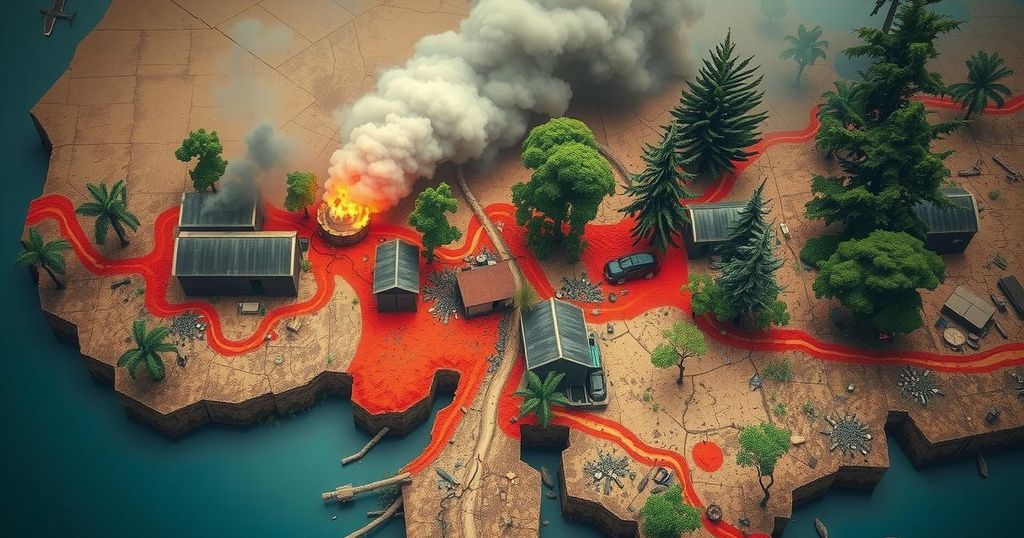The DRC army has recaptured several towns from rebel groups in eastern DRC, including Ngungu, amid ongoing fighting. The situation remains tense, with some areas still under rebel control. The region continues to face significant humanitarian challenges as many civilians remain vulnerable and displaced due to decades of conflict, particularly from the M23 rebellion.
The Democratic Republic of the Congo (DRC) army announced the recapture of several towns that had previously been occupied by armed rebel groups. The Armed Forces of the DRC (FARDC) stated that towns such as Ngungu, a strategic location near the provincial capital of Goma, were reclaimed after enduring months of rebel control. Other towns recovered include Lumbishi, Ruzirantaka, Kamatale, Bitagata, and Kabingo. According to Guillaume Ndjike Kaiko, the army spokesperson in North Kivu, these successes were attributed to a coordinated military offensive.
Despite these advances, conflict continues in the eastern DRC, particularly due to the persistent influence of the M23 rebel group. Some villages, including key areas within Masisi, remain under rebel control, complicating efforts to restore peace. The DRC has been embroiled in conflict for decades, battling over one hundred armed groups, with significant humanitarian crises resulting from these struggles. Since 2022, clashes between M23 and government forces have displaced nearly two million individuals and resulted in grave humanitarian conditions.
Villagers returning to reclaimed areas expressed concerns for their safety amidst ongoing violence. Nsabimana Alexis, a resident of Ngungu, lamented the continuing threat, stating, “We continue to suffer because the security is not well established.” Another local, Rita Ritagaza, described the traumatic realities faced by families, adding, “We hope we will have a safe place for our family away from here.”
Access to humanitarian aid remains a critical issue, as ongoing skirmishes have rendered many villages unreachable. According to David Munkley, director of World Vision in Eastern DRC, “Conditions are really difficult. We’re overstretched and we’re looking at a grim future.” Humanitarian organizations, like Doctors Without Borders (MSF), already strained, are battling to provide relief as displacement camps face increased pressure due to the influx of fleeing individuals.
The situation in eastern DRC underscores the complexity of the conflict and the urgent need for sustainable solutions to restore stability and ensure the safety of affected populations. Although the government celebrates military successes, the persistent humanitarian crisis necessitates a collective effort to address the dire needs of those impacted by decades of turmoil.
The DRC remains in a precarious position, with soldiers on the ground continuing to engage in combat while civilians face the brunt of this unending conflict.
The eastern region of the Democratic Republic of the Congo has experienced ongoing conflict for many years, characterized by the presence of numerous armed groups vying for control over resource-rich territories. This long-standing instability has been exacerbated by the M23 rebellion, which reignited in 2022, leading to the displacement of millions. The DRC government has frequently accused Rwanda of providing support to the M23 rebels, which is a significant point of tension in the regional geopolitical landscape. The humanitarian fallout from the conflict has resulted in severe crises, as millions have been killed or displaced since the onset of the conflict, prompting urgent calls for international assistance and intervention.
The recent military gains by the DRC’s Armed Forces in recapturing towns from rebel groups reflect a partial restoration of control in the conflict-ridden eastern region. However, the ongoing violence demonstrates that the situation remains complex and precarious. The humanitarian crisis persists, with many civilians caught in the turmoil and facing dire conditions. A multifaceted approach is required to stabilize the region and address the humanitarian needs of those affected by the prolonged conflict.
Original Source: www.aljazeera.com






